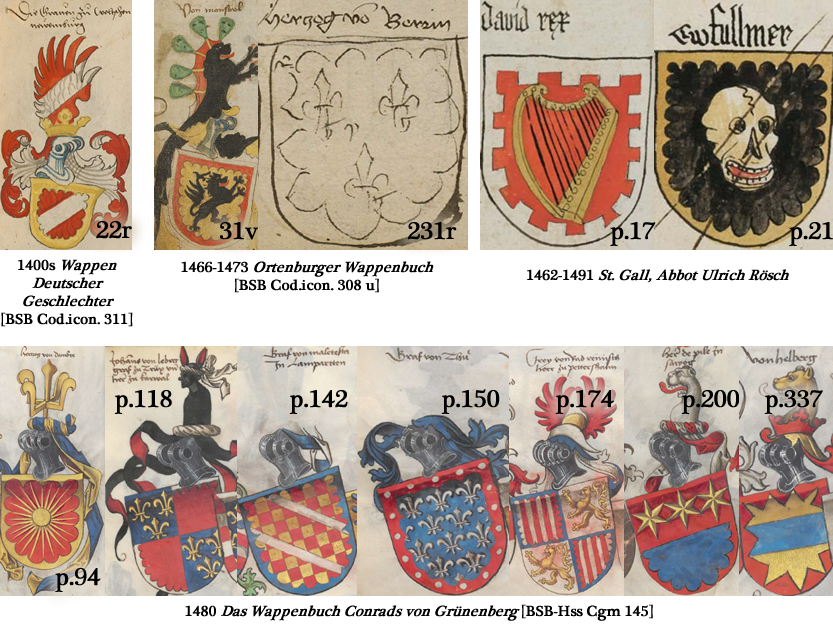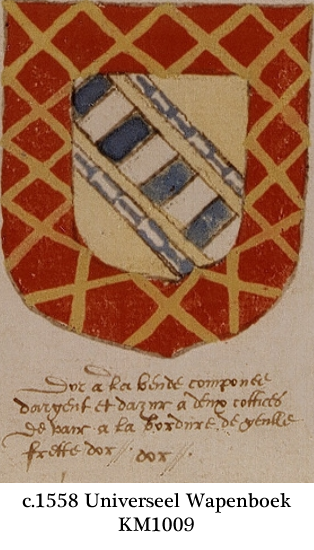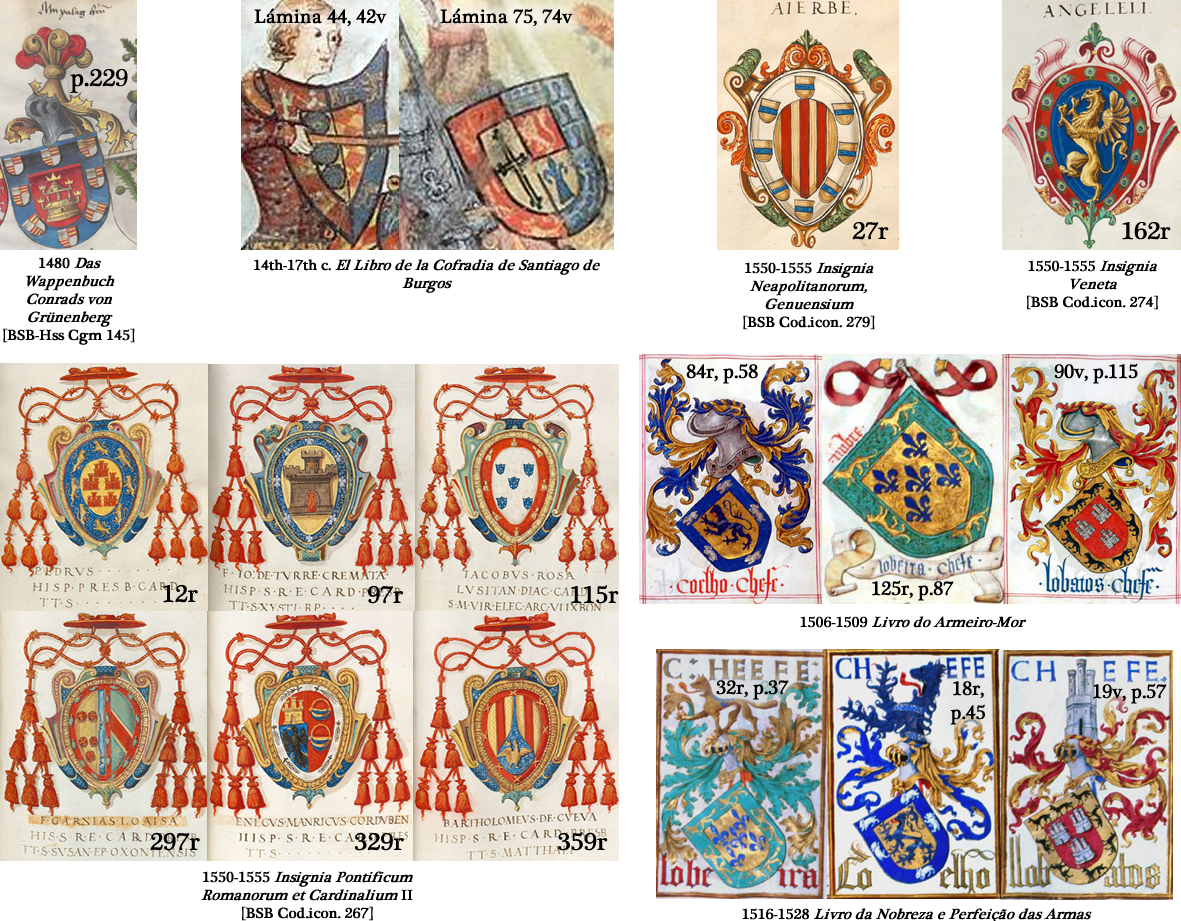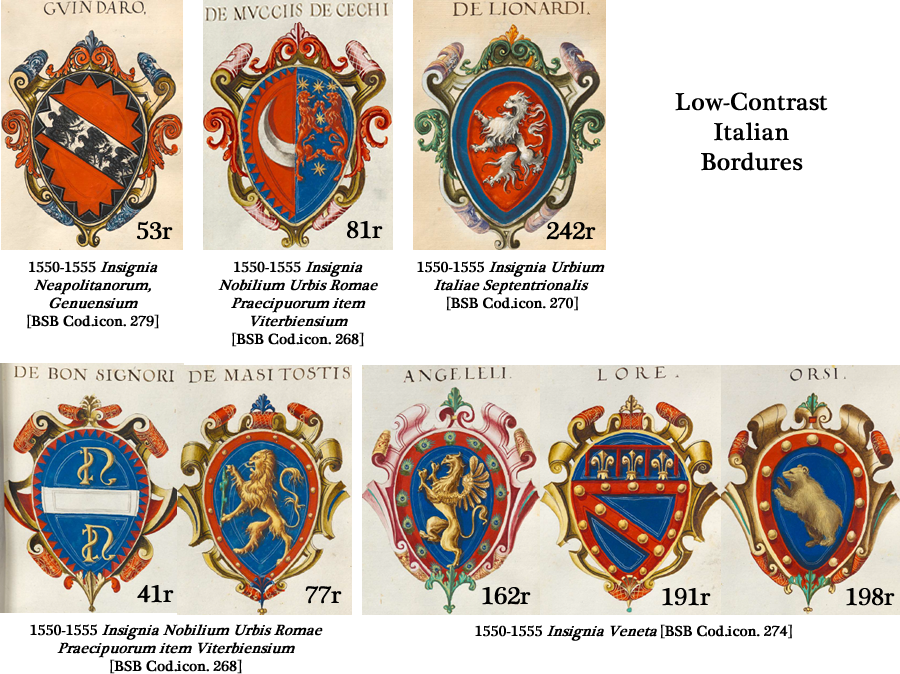Bordure
WARNING: Do not cite this page as a reference. This page is on this wikispace only to make the content "searchable" and easier to find. If you find the information you seek here, go to the original sources to verify the information and use them for your documentation.
Revised {$revisiondate}.
Illustrations:[edit | edit source]
Period sources:[edit | edit source]
Bordures with Complex Lines:[edit | edit source]
| Unusual | Unusual | Armas |
| Unusual Complex Bordure, attributed arms of King David, Ingeram Codex, f28, 1489 | Unusual Complex Bordure, Ingeram Codex, f72, 1489 | Armas de los Condes, Vescondes etc. de Cataluña, de Castilla, de Portugal - BSB 290, Spanish, 1440-1550, bordure denticulada |
 Bordures with complex lines, German
Bordures with complex lines, German
Charged Bordures:[edit | edit source]

|
| Bordure fretty, courtesy of Gunnvor silfrahar |

|
| Charges following the line of the bordure, courtesy of Gunnvor silfrahar |
Low Contrast Bordures:[edit | edit source]

Italian low-contrast bordures, courtesy of Gunnvor silfrahar
Modern:[edit | edit source]
Pictorial Dictionary of SCA Heraldry (3rd edition):[edit | edit source]
- [[1]]
Pennsic Traceable Art Project[edit | edit source]
Sources:[edit | edit source]
Academy of St. Gabriel "Medieval Heraldry Archive" - [[2]] Archive of St. Gabriel reports - [[3]] Laurel Armory Articles - [[4]] Period Armorials
See also Alternating Charges on a Bordure
Precedents:[edit | edit source]
Precedents of the SCA College of Arms - [[5]] Morsulus Heralds Website - [[6]] (to search the LoARs and Precedents) Restatement Wiki - [[7]] (restatements of Precedents) Use the above links to be sure any precedents listed below haven't been superseded by newer precedents.
Definition:[edit | edit source]
From the September 2013 Cover Letter: From Wreath: Bordures -- Can You Really Be Too Thin? One of the tenets of good heraldic art is often quoted as "big, bold, and butch." While for the most part this is entirely true, bordures in period heraldry were drawn with a variety of widths. Other ordinaries, even when uncharged, are nearly always drawn quite thick, but perhaps because of their placement around the edge of the design bordures simply don't have to try as hard to be properly noticed. Some examples of rather thin bordures:
- Insignia Anglica, BSB Cod.icon.291, 16th century, England, f.42r (@http://daten.digitale-sammlungen.de/bsb00001647/image_87) - thin bordures, wider when charged
- Wapenboek Beyeren, 15th century, Netherlands, f.001v (@http://www.kb.nl/bladerboek/wapenboek/browse/page_001v.html)
- Armorial Le Breton, 15th century, France, p. 9/52 (@http://www.culture.gouv.fr/Wave/image/archim/Pages/03082.htm)
On the other hand, heralds do need to be aware that some armorials, such as the 15th century German Ortenburger Wappenbuch, BSB Cod.icon.308u, use thin white frames around every piece of armory, as a matter of decoration. These are not bordures, and should not be used in documentation of an Individually Attested Pattern as such. For am example, see f.3r (@http://daten.digitale-sammlungen.de/bsb00001755/image_7). In general, only when a bordure could be confused with a thick outline of the escutcheon, or when any charges on it are hard to identify, is it too thin. We will continue to register thin bordures without comment. [[8]]
From the February 2006 LoAR:
Janina Krakowska. (Atlantia) Device change. Sable mulletty, a jara rune within a bordure denticulada argent.
The submitter requested that if this could not be blazoned as a bordure compony// that it be returned. If the bordure is compony this must be returned for having a mullet overlying the bordure. This must therefore be blazoned as a //bordure denticulada and is returned as the submitter requested...
A bordure compony is a two-tinctured bordure with a plain line of partition (as opposed to an embattled line of partition). This plain line of partition is obvious when the bordure compony does not share one of its tinctures with the field. It's less obvious when one of the tinctures in the compony is shared with the field, but the straight line of partition is still there. The straight outline of the compony bordure is often depicted in emblazons as an artistic detail.
A bordure denticulada is a single-tinctured bordure with a complex line of partition which takes the embattled line of partition to an extreme. In this bordure, the inside portion of the embattled line is the edge of the shield, giving the apparance of separated "teeth".
Because a bordure denticulada is a type of embattled bordure, the spaces between the embattlements are part of the field. A charge on the field may extend into the space between the embattlements without overlying the bordure, just as charges are routinely drawn as extending into the spaces between the indentations of an indented chief without overlying the chief. A bordure compony may share a tincture with the field but it is not part of the field, thus a charge on the field may not extend into the space between portions of the bordure without overlying the bordure...
http://heraldry.sca.org/loar/2006/02/06-02lar.html
#x--Precedents:-Registerability:Registerability:[edit | edit source]
(Restricted, Reserved, SFPP, OOP)
From the January 2008 LoAR: "The most common depiction of a chief and a bordure has the chief overlying the bordure__; however, precedent indicates that there are __some examples of bordures overlying chiefs (v. Ambrosius MacDaibhidh, December 1995). Prior precedent states: Please note that the design of counterchanging a bordure over a pile is considered "a weirdness" in the SCA - a single step from period practice (per the LoAR of July 2001). One such step in armory is acceptable, but more than one such step is considered too far from period practice and reason for return. [Clef of Cividale, 03/03, R-Calontir] Similarly, barring period evidence of such counterchanging, counterchanging a bordure over a chief is also a step from period practice." [2008 LoAR]
August 1993 - voided and fimbriated bordures:[edit | edit source]
Lisette de Ville. Device. Per fess purpure and vert, a dove displayed, wings inverted within a bordure argent charged with a tressure per fess purpure and vert. "The submission caused us a few minutes of heartburn. The equal width of the outer three stripes, and the fact that the central stripe is of the field, gave this the appearance of a bordure voided,// not of an //orle within a bordure.// Bordures voided and fimbriated have been disallowed since Aug 83. Playing with the widths a bit, to make this a //bordure cotised,// would be equally unacceptable. On the other hand, a //bordure charged with a tressure// is a perfectly legal design. In the end, we decided that the latter blazon is the most accurate and reproducible description of the submitted emblazon -- and since it appears to be legal, we've accepted it. It also guarantees the device to be clear of Wampage (//Azure, an eagle displayed within a double tressure argent). http://heraldry.sca.org/loar/1993/08/lar.html
#x--Precedents:-Conflict:Conflict:[edit | edit source]
#x--Precedents:-Identifiability:Identifiability:[edit | edit source]
Collected Precedents:[edit | edit source]
2nd Tenure of Elisabeth de Rossignol (April 2011 - August 2011) - [Armory Precedents]
1st Tenure of Elisabeth de Rossignol (May 2005 - July 2008) - [[9]] The 2nd Tenure of François la Flamme (October 2004 - May 2005) - [[10]] The Tenure of Shauna of Carrick Point (May 2004 - August 2004) - [[11]] The 1st Tenure of François la Flamme (August 2001 - April 2004) - [[12]] The Tenure of Elsbeth Anne Roth (June 1999 - July 2001) - [[13]]
The Tenure of Jaelle of Armida (June 1996 - June 1999) - Bordure see [[14]]
The 2nd Tenure of Da'ud ibn Auda (November 1993 - June 1996) - [[15]] The Tenure of Bruce Draconarius of Mistholme (June 1992 - October 1993) - [[16]] The 1st Tenure of Da'ud ibn Auda (June 1990 - June 1992) -
The Tenure of Alisoun MacCoul of Elphane (September 1986 - June 1990) - [[19]]
The Tenure of Baldwin of Erebor (August 1984 - August 1986) - [HTML Document]
The Tenure of Wilhelm von Schlüssel (August 1979 - August 1984) - BORDURE, BORDURELET
The Tenure of Karina of the Far West (December 1975 - June 1979) - [[20]] The Early Days (June 1971 - June 1975) - [[21]]
In the Ordinary (as of 4/2012):
- [- Uncharged - Plain line - Argent - Not surrounding]
- [- Uncharged - Plain line - Argent - Surrounding 1 only]
- [- Uncharged - Plain line - Argent - Surrounding 1 plus]
- [- Uncharged - Plain line - Argent - Surrounding 2]
- [- Uncharged - Plain line - Argent - Surrounding 3 or more]
- [- Uncharged - Plain line - Azure]
- [- Uncharged - Plain line - Fur]
- [- Uncharged - Plain line - Gules]
- [- Uncharged - Plain line - Multicolor - argent - and azure]
- [- Uncharged - Plain line - Multicolor - argent - and fur]
- [- Uncharged - Plain line - Multicolor - argent - and gules]
- [- Uncharged - Plain line - Multicolor - argent - and multicolor]
- [- Uncharged - Plain line - Multicolor - argent - and or]
- [- Uncharged - Plain line - Multicolor - argent - and purpure]
- [- Uncharged - Plain line - Multicolor - argent - and sable]
- [- Uncharged - Plain line - Multicolor - argent - and vert]
- [- Uncharged - Plain line - Multicolor - azure - and fur]
- [- Uncharged - Plain line - Multicolor - azure - and gules]
- [- Uncharged - Plain line - Multicolor - azure - and multicolor]
- [- Uncharged - Plain line - Multicolor - azure - and or]
- [- Uncharged - Plain line - Multicolor - azure - and purpure]
- [- Uncharged - Plain line - Multicolor - azure - and sable]
- [- Uncharged - Plain line - Multicolor - azure - and vert]
- [- Uncharged - Plain line - Multicolor - fur - and fur]
- [- Uncharged - Plain line - Multicolor - fur - and gules]
- [- Uncharged - Plain line - Multicolor - fur - and multicolor]
- [- Uncharged - Plain line - Multicolor - fur - and or]
- [- Uncharged - Plain line - Multicolor - fur - and purpure]
- [- Uncharged - Plain line - Multicolor - fur - and sable]
- [- Uncharged - Plain line - Multicolor - fur - and vert]
- [- Uncharged - Plain line - Multicolor - gules - and multicolor]
- [- Uncharged - Plain line - Multicolor - gules - and or]
- [- Uncharged - Plain line - Multicolor - gules - and purpure]
- [- Uncharged - Plain line - Multicolor - gules - and sable]
- [- Uncharged - Plain line - Multicolor - gules - and vert]
- [- Uncharged - Plain line - Multicolor - multicolor - and or]
- [- Uncharged - Plain line - Multicolor - multicolor - and purpure]
- [- Uncharged - Plain line - Multicolor - multicolor - and sable]
- [- Uncharged - Plain line - Multicolor - multicolor - and vert]
- [- Uncharged - Plain line - Multicolor - or - and purpure]
- [- Uncharged - Plain line - Multicolor - or - and sable]
- [- Uncharged - Plain line - Multicolor - or - and vert]
- [- Uncharged - Plain line - Multicolor - purpure - and sable]
- [- Uncharged - Plain line - Multicolor - purpure - and vert]
- [- Uncharged - Plain line - Multicolor - sable - and vert]
- [- Uncharged - Plain line - Or - Not surrounding]
- [- Uncharged - Plain line - Or - Surrounding 1 only]
- [- Uncharged - Plain line - Or - Surrounding 1 plus]
- [- Uncharged - Plain line - Or - Surrounding 2]
- [- Uncharged - Plain line - Or - Surrounding 3 or more]
- [- Uncharged - Plain line - Purpure]
- [- Uncharged - Plain line - Sable - Not surrounding]
- [- Uncharged - Plain line - Sable - Surrounding 1 only]
- [- Uncharged - Plain line - Sable - Surrounding 1 plus]
- [- Uncharged - Plain line - Sable - Surrounding 2]
- [- Uncharged - Plain line - Sable - Surrounding 3 or more]
- [- Uncharged - Plain line - Vert]
- [- Uncharged - Jagged - Argent]
- [- Uncharged - Jagged - Azure]
- [- Uncharged - Jagged - Fur]
- [- Uncharged - Jagged - Gules]
- [- Uncharged - Jagged - Multicolor]
- [- Uncharged - Jagged - Or]
- [- Uncharged - Jagged - Purpure]
- [- Uncharged - Jagged - Sable]
- [- Uncharged - Jagged - Vert]
- [- Uncharged - Long - Argent]
- [- Uncharged - Long - Azure]
- [- Uncharged - Long - Fur]
- [- Uncharged - Long - Gules]
- [- Uncharged - Long - Multicolor]
- [- Uncharged - Long - Or]
- [- Uncharged - Long - Purpure]
- [- Uncharged - Long - Sable]
- [- Uncharged - Long - Vert]
- [- Uncharged - Square - Argent]
- [- Uncharged - Square - Azure]
- [- Uncharged - Square - Fur]
- [- Uncharged - Square - Gules]
- [- Uncharged - Square - Multicolor]
- [- Uncharged - Square - Or]
- [- Uncharged - Square - Purpure]
- [- Uncharged - Square - Sable]
- [- Uncharged - Square - Vert]
- [- Uncharged - Wavy - Argent]
- [- Uncharged - Wavy - Azure]
- [- Uncharged - Wavy - Fur]
- [- Uncharged - Wavy - Gules]
- [- Uncharged - Wavy - Multicolor]
- [- Uncharged - Wavy - Or]
- [- Uncharged - Wavy - Purpure]
- [- Uncharged - Wavy - Sable]
- [- Uncharged - Wavy - Vert]
- [- Charged - Plain line - Argent]
- [- Charged - Plain line - Azure]
- [- Charged - Plain line - Fur]
- [- Charged - Plain line - Gules]
- [- Charged - Plain line - Multicolor]
- [- Charged - Plain line - Or]
- [- Charged - Plain line - Purpure]
- [- Charged - Plain line - Sable]
- [- Charged - Plain line - Vert]
- [- Charged - Complex line - Argent]
- [- Charged - Complex line - Azure]
- [- Charged - Complex line - Fur]
- [- Charged - Complex line - Gules]
- [- Charged - Complex line - Multicolor]
- [- Charged - Complex line - Or]
- [- Charged - Complex line - Purpure]
- [- Charged - Complex line - Sable]
- [- Charged - Complex line - Vert]
- Bordure of flame - see Fire and Bordure
- Bordure of flowers - see Bordure and [[22]] and Orle